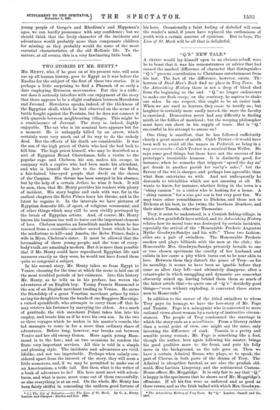TWO STORIES BY MR. HENTY.*
MR. HENTY, who, if he goes on at his present rate, will soon use up all human history, goes to Egypt as it was before the Exodus for the subject of the first of these two stories. It is perhaps a little surprising to find a Pharaoh of so early a date employing Etruscan mercenaries. But this is a trifle ; nor does it seriously interfere with our enjoyment of the story that there appears to be a slight confusion between Herodotns and Juvenal. Herodotns speaks, indeed, of the thickness of the Egyptian skull, which he had observed on the scene of a battle fought against the Persians, but he does not connect it with quarrels between neighbouring villages. This might be a reminiscence of Juvenal. The story is, indeed, highly enjoyable. The cat who is its nominal hero appears but for a moment. He is unhappily killed by an arrow, which certainly went very much out of its way to do the unholy deed. But the effects of his death are considerable. It was the son of the high priest of Osiris who had the bad luck to kill him. The high priest himself, who may be described as a sort of Egyptian Broad Churchman, falls a victim to the popular rage, and Chebron, his son, makes his escape, in company with a captive who had been made his attendant, and who is himself the heir to the throne of the Rebu, a fair-haired, blue-eyed people that dwelt on the shores of the Caspian. His throne has been usurped in his absence, but by the help of a certain Jethro he wins it back. It will be seen, then, that Mr. Henty provides his readers with plenty of incident. His story begins and ends with war, for in the earliest chapters the Rebu Prince loses his throne, and in the latest he regains it. In the intervals we have pictures of Egyptian domestic life, of sport, of religious ceremonial, and of other things which may still be seen vividly portrayed by the brush of Egyptian artists. And, of course, Mr. Henty knows his business too well to leave out the important element of love. Chebron marries an Israelitish maiden whom he has rescued from a crocodile—another sacred beast which he has the misfortune to-kill—and Amuba, the Rebu Prince, finds a wife in Mysa, Chebron's sister. It must be allowed that the lovemaking of these young people, and the tone of every- body's talk, are amazingly modern. But it is more than possible that if Mr. Henty could have reproduced Egyptian life and manners exactly as they were, he would not have found them quite so congenial a subject.
In his second story, Mr. Henty takes us from Egypt to Venice, choosing for the time at which the scene is laid one of the most troubled periods of her existence. Into this history Mr. Henty, as he tells us in his preface, has woven the adventures of an English boy. Young Francis Hammond is the son of an English merchant trading in Venice. He earns the friendship of a great Venetian merchant prince by twice saving his daughters from the hands of one Ruggiero Mocenigo, a ruined spendthrift, who attempts to carry them off that he may retrieve his fortunes by marrying the eldest. As a mark of gratitude, the rich merchant Polani takes him into his employ, and treats him as if he were his own son. In the two or three voyages which he makes in his master's vessels, the lad manages to come in for a more than ordinary share of adventures. Before long, however, war breaks out between Venice and her old enemy Genoa. Here again young Ham- mond is to the fore ; and on two occasions he renders the State very important services. All this is told in a simple and pleasing style. The incidents and adventures are vivid, lifelike, and not too improbable. Perhaps when calmly con- sidered apart from the interest of the story, they will seem a little numerous, and, if we may be permitted to make use of an Americanism, a trifle tall. But then, what is the writer of a book of adventure to do? His hero must meet with adven- tures, and what is more, must come out of them successfully, or else everything is at an end. On the whole, Mr. Henty has been fairly skilful in concealing the uniform good fortune of
• (.) The Cat of Bubastes.—(2.) The Lion of St. Hark. By G. A. Henty. London and Glasgow: Blackie and Son. 1899.
his hero. Occasionally a faint feeling of disbelief will cross the reader's mind, if years have replaced the enthusiasm of youth with a certain amount of cynicism. But to boys, The Lion of St. Mark will be all that is delightful.


















































 Previous page
Previous page